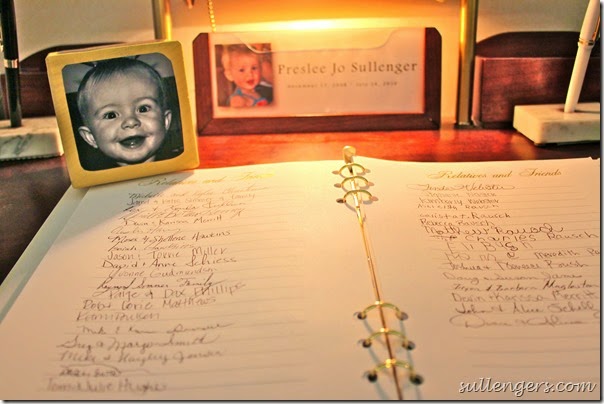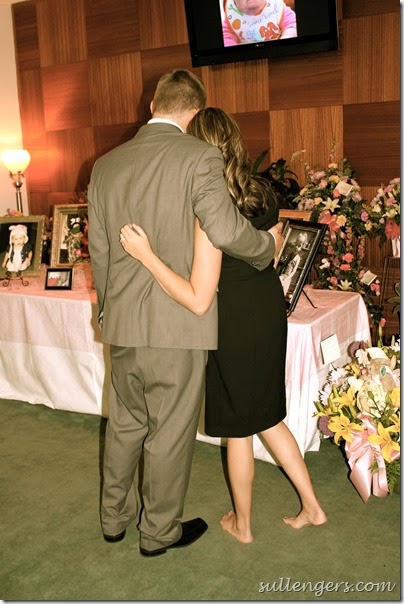Image may be NSFW.
Clik here to view.
A couple of weeks ago, a sweet elderly lady in our ward unexpectedly lost her husband. Patrick stayed home with the kids, and I attended the viewing. As I walked up to this sweet sister, without thinking, the first words out of my mouth were, “How are you doing?” Seriously? I wanted to kick myself. I was mortified. I seriously asked her, “How are you doing?” It just slipped out of my mouth before I realized I was saying it. Just following Preslee’s death, I dreaded running into people I knew, because it seemed like the first thing they always asked was, “How are you doing?” It felt wrong faking a smile, and saying, “Good,” when I really wanted to scream, “Horrible! My daughter died. I’m lost, depressed, and not functioning. I’m not doing well.” But I didn’t think that was appropriate answer while standing in the middle of the grocery store. So of course I was embarrassed when I heard myself ask the same question I tried avoiding for so long. When I got home, I discussed how the viewing went with Pat, which led to a conversation about what we appreciated and what we disliked hearing during Preslee’s viewing.
Note: This isn’t being written to hurt anyone’s feelings. We appreciated every single person who attended Preslee’s viewing. Before losing Preslee I had no idea what to say to someone at a viewing, and clearly, from my experience up above still don’t have it perfected. But this is a common question Pat and I both constantly receive, so I thought I’d share what we’ve learned.
Image may be NSFW.
Clik here to view.
What to Say (and Not Say) to Someone at a Viewing
Don’t be embarrassed if you cry.
It really is okay to cry. I was surprised when the entire night wasn’t a tear fest. Yes, I still cried, but I remember multiple people telling Pat and I that we looked different, we looked so strong. I remember thinking, “Really? My daughter just died.” But looking back, I strongly believe it was due to the prayers beings said in our behalf. We were being buoyed up. People were constantly apologizing for their tears, but we understood. Don’t feel embarrassed if you cry and they don’t.
Make sure you know the facts before speaking.
Sometimes it isn’t common knowledge about how the person passed away. If this is the case, please don’t assume anything. When some people spoke to us, it was clear they didn’t know anything other than Preslee had drowned, and assumed different things. It created awkward moments, and we didn’t want to embarrass them. If we kindly corrected them, it usually led to questions, which made it difficult to keep the line moving, and also leads to my next suggestion.
Don’t bombard the person with questions.
It was difficult speaking with people who bombarded us with questions. Their questions usually referred to how Preslee had drowned, but at that time, Pat and I still didn’t know all the facts. Russell Friedman of The Grief Recovery Institute explains, “After that initial numbness wears off, the most common physiological reaction is a reduced ability to concentrate.” Therefore, being asked a lot of questions was not only difficult to respond to, it also just wasn’t the right time to be put on the spot.
Don’t be offended if they forget your name.
I recently heard someone upset that their name was forgotten at a viewing. Please don’t take it personally. Pat and I were surprised how many people showed their support by attending the viewing. The night before the funeral, the line lasted for nearly four hours. By the end of the night, we weren’t thinking straight and were emotionally and physically drained. Sometimes a person’s name slipped from our minds.
Every situation is different.
Because every situation is different, it really is hard to know what to say. But one reoccurring comment we received throughout the viewing was, “You are way too young to have to experience this!” It was true, I was 22, Pat 25, and less than three years earlier the same people who were walking through Preslee’s viewing line, had attended our wedding reception. But after hearing this comment over and over again, by the end of the night we didn’t know how to respond, and surprisingly it started to bother us. I remember thinking, “What does it matter our age? It still happened didn’t it? Clearly I’m not too young to experience this.” In the end it made me a little more bitter because if everyone thought I was too young, why did it happen?
Don’t tell them you know how they feel.
I think it’s a natural human reaction to want to sympathize and relate to another person during a conversation. I remember a man telling us he understood what we were going through because he had lost his Grandma. That statement really bothered me, I remember thinking, “But losing a Grandma isn’t losing a child. Your grandma didn’t live with you, you didn’t give birth to her, I love my Grandma differently than my child. it just isn’t the same.” We’ve heard it all, people telling us they understand because they’ve lost a grandparent, cousin, neighbor, or their dog… and please just know that sending an LDS missionary out for two years isn’t the same as losing a child.
Image may be NSFW.
Clik here to view. Image may be NSFW.
Image may be NSFW.
Clik here to view. Image may be NSFW.
Image may be NSFW.
Clik here to view.
What We Appreciated:
Just attending the viewing shows that you care.
I remember becoming emotional when seeing family, close friends, people I hadn’t been extremely close to in high school, and I saw what it meant to Pat when people from his childhood ward came to show their support. It showed us we weren’t alone and we really had a huge support group rallying behind us. When in doubt about attending the viewing, go. Your presence won’t go unnoticed.
Compliments go a long way.
At the viewing, I was first in line. I stood in-between Preslee’s casket, and Patrick. When people complimented anything about Preslee, my heart swelled with pride. Though she had passed away, she was still my little girl, who I still fiercely loved. I appreciated compliments about her hair, her dress, how good she looked, or even her casket. Looking back it made our conversation positive rather than doom and gloom.
Those that acknowledged they didn’t know our pain.
Pat said the comment that meant the most to him was, “Though I don’t understand what you are feeling, please know we’re here for you.” After losing Preslee we learned it’s impossible to understand grief until you’ve experienced it for yourself. Their acknowledgment went a long way in our book.
What I tend to say:
Obviously each viewing is different, so my personal comments change, but in summary, I tend to say something similar to this. I usually begin with a compliment, such as letting them know how great the pictures turned out, how nice the casket is, or even how great the person who has passed away looks. Then I usually say something similar to this. “I know there isn’t really anything that I can say to lessen your pain, we want you to know how much we’ve been thinking about you. You’ve been in our prayers. If there is anything you ever need, please don’t hesitate to ask. We’ve learned this trial is too difficult to take on by yourself. Just know we love you and think about you all the time.”
Have you experienced a viewing for yourself? What comments did you find most helpful or hurtful?